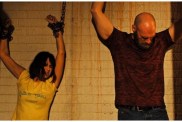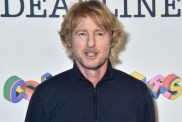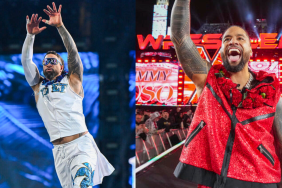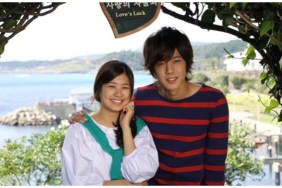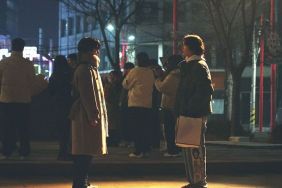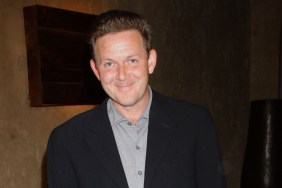Returning for its second season this Sunday with a special two-hour premiere, “Falling Skies” continues the story of a world ravaged by an alien invasion and the band of survivors that, through necessity, have become civilian soldiers in the fight against the extraterrestrial menace. The group, dubbing themselves the “2nd Mass” after the Revolutionary War’s First Massachusetts Regiment, were dealt quite a blow at the conclusion of the first season and the new episodes pick up almost immediately, showing what happens after Noah Wyle’s Tom Mason boards the alien craft.
ComingSoon.net had the opportunity to attend a special press day event and spoke with several of the show’s key cast members, including Wyle and his on-screen son Drew Roy as well as Moon Bloodgood, who plays the 2nd Mass medic, Anne, and Colin Cunningham, the movement’s oft-antagonistic member, John Pope.
In the below set of interviews, the four actors talk about the new approach to the second season, moving production from Vancouver to Toronto and what fans can expect to see as season two unfolds over the next ten weeks.
Q: Where do you find your character as season two begins?
Drew Roy: It picks up almost exactly where we left off, inexplicably getting on the spaceship. Then there’s a passage of time of three months where he’s been in captivity and released far from where they picked him up. He’s got to make this journey back to the group and, obviously, a lot has happened in his absence. After three months the rest are maybe holding on to that little dream that he’s coming back but it’s really been getting kind of bleak. In the meantime, Hal has kind of stepped up as a leader. He’s also kind of become this paternal figure because he’s got Matt, who’s just a nine-year-old kid and Ben, who’s 14-ish and is just coming in to becoming a man. That same animosity that Hal has, Ben has it as well. They definitely butt heads on a couple of subjects. Hal’s leading this little group and Ben has to take orders from him and doesn’t always like to do that. He has this new, personal vendetta against the skitters, Ben does, to kill all of them no matter what, even if it means putting him or other people at risk. That causes some confrontations.
Q: A lot of the second season sounds like it’s dealing with Tom’s experience on the ship. How in the dark are you when it comes to knowing what might have happened to your character in those three months?
Noah Wyle: Well, we wrote ourselves into a pretty good corner last year going onto the spaceship without quite knowing how to get him off or what was going to happen. But it afforded us the opportunity to have an inside view of what the spaceship and the technology looks like as well as a face-to-face confrontation with the Overlords and the realization that there isn’t really a negotiation to be had. They’re occupying with the intent of total annihilation and there isn’t really a peace to be brokered. Tom comes back as a bit of a realist. He doesn’t hold any illusions that there’s going to be a rapprochement of any kind. He goes from retaining a certain hope of being able to rebuild society in a better image than the one they had before to having to sidetable all of that until the threat’s been completely erased. He may be a security risk. He may be a liability to the group. He’s not sure what they did to him. He’s as suspicious of his own actions as others are.
Q: I’d imagine there’s a lot of tension between Tom and Pope.
Wyle: There’s always tension with Pope.
Q: Can you talk a bit about what drives Tom?
Wyle: Yeah, he’s a guy who is very reluctant to accept the mantle of responsiblity and leadership. First and foremost, he just wants to keep his family alive and intact. That was pretty much the overriding theme of the first season. How to keep his kids with him and safe in the context of being given this greater resposnibility of leading the civilian side of the Second Massachusetts. I think that, in his absence, he hopes that his kids have survived and, when he comes back to find that that they haven’t just survived but thrived, I think that releases a lot of the tension and pressure of having to pay such close attention to them and allows him to really embrace stepping up to a larger degree his leadership role in the 2nd Mass.

Q: What’s the relationship like between Tom and Dr. Glass in season two?
Wyle: It was a relationship that, in the first season, we had a little difficulty with as far as finding moments of intimacy. As soon as we would try it, it seemed to dissapate all the tension that was there and the threat level that was supposed to be ever-present. We’d write scenes where I’d be on guard duty and she’d bring me a sandwich and we’d talk about sweet nothings. We wouldn’t end up shooting them because it was going to be counter-productive to our aims. So that left us with two options: We could either let the relationship play across crowded rooms with two busy people wishing that situations were different or I could grab her and pull her into a supply closet and have it be a moment of passion that was based more on tapping into some human need. We chose the former and really kind of paced that relationship out, culminating in a really nice kiss in the last episode. He trusts the care of his kids to Anne while he goes on what could be a suicide mission. This season we spend more time in the supply closet.
Q: This is a very different character that what you’ve played in the past. Was that a big draw for taking the role?
Wyle: Sure, that’s a big part of picking and choosing work, assuming you get to pick and choose work. More often than not, it’s less of a grand design and more about the opportunities that are presented to you. But I was looking to do a character that was very different from Dr. John Carter, but still looking to find one that had as vast an arc ahead of him as that one did. The pilot episode of “E.R.” was his first day on the job in the hospital, so he had the longest road to travel professionally. Similarly, Tom Mason, as an academic character, had the farthest road to travel to become a military leader. That seemed like an interesting challenge, plus it’s a physically demanding and dynamic character, which I hadn’t really done a lot of. It’s also a totally new genre as well.
Q: Do you find that television has changed a lot and do you think it’s for the better?
Wyle: Yes, in some ways. I mean, it’s not the ’90s. They don’t pay what they used to.
Q: Drew, can you talk a bit about playing a character that is both a teen and, by necessity, forced to become very adult?
Roy: The cool thing about Hal is that he is so young, but he’s put in this position of power. One of the things I like to find is moments to show where he’s wiser than his age and then other moments to show how old he actually is. In this second season, I don’t think he even has to look back. He just has to step in and fill that void. On top of losing his dad, the whole Second Massachusetts has lost a significant amount. He took the offensive to them at the end of last season but, in all actuality, we just pissed them off. Now they’re after us and we’re on the run. Everybody has to man up and fill that position we’re put in.
Wyle: Or woman up.
Roy: Or woman up. Man up or woman up. So we find ourselves with everybody having to do that. I think that Hal has embraced that that has allowed him to step up and take this new position. Hal’s a confident guy. I don’t think that he ever questions if he can handle something until he’s already in it. Then he might have those feelings, but if the opportunity is given to him, I think he says yes.
Q: With his dad coming back, is he willing to step back, or does he want that leadership role?
Roy: I think he always wanted that leadership role and I think that, with the relationship we have, we keep each other in check. I always think of it as he liking to think things out and really have a plan going whereas Hal just thinks with his heart more often. He’d like to just make something happen. When the two of us are together, he holds me back sometimes and I push him forward. But in his absence, I’ve had to slow myself down and take time to make sure I wasn’t doing something foolish. I was no longer just the catalyst. I had to actually go through with it. I think it makes Hal a stronger leader as well as a stronger person.
Q: How was it shooting the first FX-heavy Overlord scene?
Wyle: It was a gigantic soundstage all draped in green silk. I stood on a piece of tape on the floor and they put a tennis ball on the end of a stick and said, “This is a ten foot tall Overlord staring down at you from, we think, a throne. Maybe a podium, but probably a throne. Maybe there’s a glass floor and you can see the Earth spinning beneath you.” That’s about as much direction as I got.

Q: For this season, shooting has moved to Vancouver. How different has that been?
Wyle: There’s a lot of differences, yeah. Certainly having a whole new crew is significant. We brought only two people from Toronto: our camera operator Michael Soos and our script supervisor Maggie Craig. Starting with new crew was different. Starting in a new city was different. We had a new showrunner, Remi Aubuchon. So the same characters and the same premise, but different personnel all the way through with the exception of the cast. I knew from the outset, from the first script, that this was going to be an easier year in a lot of ways because we didn’t have to dedicate so much of our screentime to exposition. This is the world, these are the characters, these are the aliens, this is what happened. That’s what you need to know. We could kind of build on the storytelling momentum from last year and really have the group, because of the battle that has taken place that thinned the ranks considerably, be much more mobile. They’re no longer stationary in a high school for three or four or five episodes. They’re constantly on the move and constantly being followed. It ramps up the pacing and the tension quite considerably. Being on the move really makes the season propel along quite interestingly. I was also surprised that, moving from Toronto to Vancouver, we could still find that industrial look. I don’t think it looks too different except for maybe the mountains in the background. We traded cold for wet.
Q: How is working with Terry O’Quinn?
Wyle: Terry is phenomenal. He’s just great. He’s a consummate professional and a true journeyman actor who came in totally prepared and game to jump on our fast-moving train. By the nature of shooting mostly at night, you go to work at two or three in the afternoon and work until the sun comes up most days. It’s long and difficult shooting and he was game. He was terrific.
Q: There’s a lot of genre television on these days. Are you both a fan of sci-fi/fantasy?
Roy: I like to just watch anything that’s a good story being told. I don’t watch anything because of the genre. But if a good story is being told, count me in. I loved “District 9” and love “Game of Thrones.”
Wyle: I watch “Game of Thrones.” I’m about three or four episodes through the first season and it’s almost hooking me. I’m gonna stick with it a little longer. But no, sci-fi is not a genre I usually gravitate towards. I like catching up on “Breaking Bad.”
Q: Why do you think that people who don’t necessarily like science fiction will watch “Falling Skies”?
Wyle: Well, the feedback that I’ve gotten sort of validates the sensibility that I went into it with which is that it’s a science fiction show, but just to serve as the backdrop for some pretty human storytelling. In a lot of ways, it’s probably more analogous to a war film than to a science fiction. That was certainly the kind of source material I was watching. Will Patton and I traded DVDs back and forth and they tended to be John Ford, John Wayne war or westerns. It had the same sense of a people with camaraderie up against an undefeatable enemy. Disparate personalities, pulled together for a common good. Those were themes that we explored pretty regularly.
Q: In the season premiere, there seems be a distrust for Noah Wyle’s character. Does that play out throughout the season?
Colin Cunningham: Absolutely positively yes. In episode one or two, he comes back and there’s this celebration and reunion and it’s about, “Oh my god!” He’s maybe not in the best of health and he’s got to be taken care of and nursed and everybody is happy except for Pope. He’s like, “What, are you all stupid?! The man just spent three months in an alien ship and now he just shows up dancing around and having a great time? The logical question that no one is asking is, ‘Where has he been? Has he said anything?’ He could potentially be a homing beacon for the whole 2nd Mass. We could be annihilated tomorrow. What the hell is the matter with you people?” It’s great because Moon’s character is all about, “The love of my life is back to care of us.” Everybody is like that. Pope is the guy saying, “No, no. You should put a bullet in this guy’s head.”
Moon Bloodgood: He gets to say what all of us are thinking and wish we had the nerve to say. He gets to be that guy. He gets to say what’s maybe on people’s minds but they don’t because they want to be part of the collective. Pope doesn’t. He’s renegade and wants to speak the truth. He’s not here to conform.
Cunningham: Yeah, so when he comes back, everyone else is like, “Get him a blanket” and I’m like, “Get me a bullet. This is insane.”
Q: Do you, as an actor, already know how your character’s paranoia pans out?
Cunningham: Well, you’ll have to see the season to see all these wonderful little mysteries play out, but there’s definitely a tension in terms of that storyline. And Mason, being an intellectual and being so self-aware, begins to have his own doubts in terms of what’s going on with him. If it was you, I wouldn’t trust you. If it was me, I wouldn’t trust me in the same situation.

Q: You have a very different physical look when you’re playing Pope. How does the costume help you get into the role?
Cunningham: For me, that’s what I always loved to do. I’ve never been the chiseled jaw Roman hunk and all my favorite actors are all character actors. The more I can just kind of disappear, the better. It’s weird. I’m starting to change it because it’s silly, but I used to say that I’m not too crazy about being recognized. I like to be acknowledged, but I realize now that it kind of comes with the situation. But it’s wonderful. I get to play this character on a show that I absolutely adore and still get to go to the supermarket and nobody really knows me. I love it. Look, they wouldn’t hire me if I was walking in as Pope right now. When I got the audition, it didn’t really even have the description of the guy. It just said he was a bit of a badass. I said, “Okay, I want hair. I want tattoos. I want a beard.” I figured, if I don’t give, I don’t get it. They can hire somebody else if they don’t want me. But I take that as a compliment. “You don’t look anywhere near as cool! You look like a total nerdy dweeb!” (laughs)
Q: Pope has always been a shoot-first-and-ask-questions-later type of guy and now we see that Ben, Tom’s son, is doing the exact same thing. Are we going to see some scenes between the two of them?
Cunningham: Oh boy, that’s a great idea! The reason it hasn’t happened yet is because I don’t think that Pope trusts Ben for beans. He’s been touched by these things. If anything, he’s a liability. He’d shoot Ben in a heartbeat.
Bloodgood: You’re going to see more of that with Ben and Hal. You’re going to see two brothers go head to head because suddenly the younger brother has more physical capabilities. He’s more able, so they’re going to go more head-to-head.
Cunningham: Ben all of a sudden becomes a little stronger, a little faster, a little more a lot of things.
Bloodgood: He’s really the character that blossoms this year. He’s a good character to focus on, too, because he’s a human but also has this harness. You’re trying to figure out his alliance. Where does he line up? I think he’s kind of an interesting character that they focus in on.
Cunningham: And you can’t really speak for Ben’s character, but boy does that character go through a lot. It’s really from boyhood to manhood and from human to hybrid. It’s a lot of stuff going on with that character this season.
Q: If Pope has all this distrust, why is he still with the 2nd Mass?
Cunningham: It is a good question, but I’ll say that, if you tune in, it doesn’t last long. He asks himself the same question and says, “To hell with all of you.” You’ll have to see how that comes about. But Pope asks that question about himself and then answers his own question.
Q: Throughout the series, there’s a balance between the war side of things and the human dynamic. How do you approach balancing that as an actor?
Bloodgood: What I do love about the show is that it’s not overly sentimental, at least with the romantic storylines. The nuances are there. It’s very slight and not stuffed down your throat. I feel like it’s tricky to represent a world that you’ve never inhabited. None of us can say that we’ve lived in a world where there are aliens, we’ve lost everyone we know and now we have to have some levity with people around us. I don’t have a frame of reference in my own life, I just know that, when I had scenes, I am in a state of despair. It’s a very mild despair that kind of permeates the room, but, at the same time, there’s this hopefulness. I was always trying to balance, “I lost my family. What are people like when they have real loss? They’re forlorn. They’re hardened.” So I tried to have that, but my character is also the optimistic one, always hopeful and selfless. I was always trying to think about that when I was doing scenes. If I’m going to laugh, maybe also burst into tears because I need that release. You have to keep that state of mind, which isn’t always easy to do. Sometimes you want to come to work and just eff around. “I don’t want to feel like it’s the end of the world today! It’s too much!” (laughs) It can really grind on you.
Cunningham: I would say that one of the neat things about “Falling Skies” is that all the characters, if they are getting together, aren’t getting together because they think one another is hot. “I’m hot. You’re hot. Let’s make out and then go and kill some aliens.” They’re soldiers. Everyone. Every single one has either killed or had someone taken from them. In an environment where you have to have somebody’s back, there’s a love there and a connection there. I think any of the relationships or the love that comes out of that isn’t because, “God, you look great in those pants and holding that M-16 looks hot.” It’s life and death and that creates a hyper-reality and you appreciate everything all the more. This could be your last breath.

Q: Moon, you’ve had a lot of genre roles. Is there an inner geek in you or is that just a coincidence?
Bloodgood: I don’t know if I can ever explain it. The only thing I know is that I love science fiction. I don’t know if I’d call myself a geek. I feel that, if you put me in Trivial Pursuit, I don’t know if I could name all the comics and shows. I know that I love “Blade Runner.” I know that I love “Aliens.” I know that horror films have always stimulated me and interested me. I think that, because I love science fiction, I see a deeper quality. I don’t just see dragons and aliens. I think of it as, “You’re facing your own mortality. You’re trying to figure out what would happen to you as a person if all the things in your life collapsed.” I always had a deeper, analytical connection with it. I think that I do science fiction for two reasons. Maybe because I gravitate towards it, so maybe I excel in those auditions or maybe because you do one and you wind up in that category. But that’s fine with me because I enjoy the category and the genre.
Cunningham: I think that, in a way, we’re all geeks. We’re not necessarily techno-geeks, but I don’t know a single actor that I’ve ever met that wasn’t somehow or in some way an outsider. I think that, in a way, we all are geeks because some part of us doesn’t quite fit in. Otherwise, we wouldn’t be in this business. We’d be doing something else. But science fiction, for anybody that has ever had an imagination, has always been strong. I don’t see it as a geek or a nerd thing. From Ray Bradbury to anybody to has ever stared at the moon. Cavemen dreamed of adventure. You think of going somewhere else.
Bloodgood: Plus, with all the new technology, I think we’re all curious to find out how much more we can see. How much better can a spaceship look? How much cooler can an alien look? How much deeper can we take this now that we have the technology to support it. There is, I think, an innate curiosity about it.
Cunningham: And it’s not so much fantasy anymore. We really are living in an age of science fiction. You’ve got this stuff right in front of you and you can beam it away and cut it and upload it and blah, blah, blah. It really is insane. We’re living in a reality now that is what people have dreamed and fantasized about forever. If they discovered tomorrow that they could teleport somebody from this pod to that pod, I don’t think anybody would flip out all that much anymore. Before, it was all, “Oh my god, no way!” or “That’s incredible!” Now it’s more, “That’s just the new app coming out for your iPhone. It’s a transporter beam. You pick it up when you want to go to Barcelona and you go.”
Bloodgood: You’ve got Tupac coming back as a hologram. That’s really the future.
Q: How has the shooting in Vancouver been for you this season?
Bloodgood: You never want to be an whimpering actor going, “Oh, it’s so hard!” You know you have a good life. But it was tough. For me, I found the rain to really wear on me. I thought, “Man, I really work hard. Anyone who ever makes me feel guilty, I want them to see our lives.” It’ll be like a Monday morning 10 o’clock call time and then a Tuesday 6pm call time. Friday you’re up till four in the morning and the sun’s coming up. You’re like, “I don’t even know who I am right now!” It’s five months of that and you work really hard and get attached and want people to like it.
Cunningham: Most shows will shoot in a studio and will shoot 12 or 13 hours a day. We’re outside in the rain, sleet and snow. It’s three, four, five, six in the morning and we’re doing 17, 18, 19 hours. It’s not fun. I mean, it’s awesome, it’s cool, it’s bitching and it it’s incredible, but you can’t say you’re having fun. It’s tough. I mean, at least we can take a break and go into our trailers and warm up. There’s other people out there working on their feet and they’ve got nowhere to go for 18, 19 hours. It’s tough on everybody.
Bloodgood: Yeah, I think that the crew actually has it the hardest. They get paid less and they work harder. I’ve felt for them many times. It makes you not want to complain sometimes.
Q: Can you each talk about what your major story arcs are this season?
Cunningham: I think that Pope’s arc this time is twofold. It’s not so much about the little spark of light in his heart anymore. I think he buries that and says, “To hell with that.” I think he becomes more of a tactician. Instead of just killing one Skidder, he want to forget the consequences and kill 30. He’s on the front line a lot more, wanting to kick some ass. But I think, ultimately, the storyline for Pope this season is that he doesn’t trust Tom. Who the hell is this guy who disappeared and is just dropped back in their lap. Why am I the only one who feels this way? Tom becomes the elephant in the room. Pope is the only one willing to shine a flashlight on it.
Bloodgood: I would say that, for my character, it’s about developing the relationship between Tom and I, but also just becoming a more seasoned doctor. I’m someone who was a pediatrician and now I’m saving lives. I think I’m much more confident and, in a lot of ways, hardened about what I can do as a doctor. There’s a lot more that I can accomplish.
Cunningham: You’re a combat medic as opposed to a pediatrician.
Bloodgood: Exactly. There’s also a great episode where Noah and I get to have our first fight. That was, as Noah said, our first adult moment. I think you get to see a little more color in Anne. There’s also my relationship with Lourdes, who is my medic-in-training. She and I have a couple of altercations. It was great. There’s a lot more color, though I feel like I’m a more neutral character. She doesn’t have all the bells and whistles. She’s more steady and constant. Sometimes she’s not the most exciting character, but she’s definitely the most earthy.
Catch the two-hour second season premiere of “Falling Skies”, this Sunday, June 17th on TNT.
